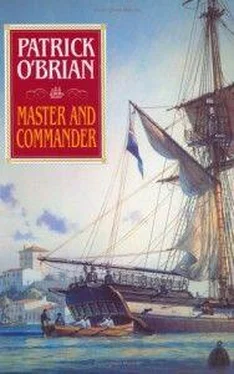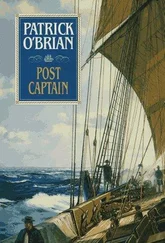Stephen was gazing over the taffrail at the long wake, his mind a thousand miles away, when he became aware of a hand gently plucking at his coat. He turned and saw Mowett smiling at him, and some way beyond Mowett Ellis on his hands and knees being carefully, desperately sick through a small square hole in the bulwark, a scuttle. 'Sir, sir, said Mowett, 'you are getting wet.'
'Yes,' said Stephen; and after a pause he added, 'It is the rain.'
'That's right, sir,' said Mowett. 'Should not you like to step below, to get out of it? Or may I bring you a tarpaulin jacket?'
'No. No. No. You are very good. No… 'said Stephen, his attention wandering, and Mowett, having failed in the first part of his mission, went cheerfully on to the second: this was to stop Stephen's whistling, which made the afterguard and quarter-deckmen – the ciew in general – so very nervous and uneasy. 'May I tell you something nautical, sir – do you hear the guns again?'
'If you please,' said Stephen, unpursing his lips.
'Well then, sir,' said Mowett, pointing over the grey hissing sea to his right in the general direction of Barcelona, 'that is what we call a lee shore.'
'Ah?' said Stephen, with a certain interest lighting his eye. 'The phenomenon you dislike so much? It is not a mere prejudice – a weak superstitious traditional belief?'
'Oh, no, sir,' cried Mowett, and explained the nature of leeway, the loss of windward distance in wearing, the impossibility of tacking in a very great wind, the inevitability of leeward drift in the case of being embayed with a full gale blowing dead on short, and the impervious horror of this situation. His explanation was punctuated by the deep boom of gunfire, sometimes a continuous low roaring for half a minute together, sometimes a single sharp report. 'Oh, how I wonder what it is!' he cried, breaking off and craning up on tiptoe.
'You need not be afraid,' said Stephen. 'Soon the wind will blow in the direction of the waves – this often happens towards Michaelmas. If only one could protect the vines with a vast umbrella.'
Mowett was not alone in wondering what it was: the Sophie's captain and lieutenant, each burning for the uproar and the more than human liberation of a battle, stood side by side on the quarterdeck, infinitely remote from one another, all their senses straining towards the north-east. Almost all the other members of the crew were equally intent; and so were those of the Felipe V, a seven-gun Spanish privateer.
She came racing up out of the blinding rain, a dark squall a little way abaft the beam on the landward side, making for the sound of battle with all the canvas she could bear. They saw one another at the same moment: the Felipe fired, showed her colours, received the Sophie's broadside in reply, grasped her mistake, put up her helm and headed straight back to Barcelona with the strong wind on her larboard quarter and her big lateens bellying out and swaying wildly on the roll.
The Sophie's helm was over within a second of the privateer's: the tompions of the starboard guns were out: cupping hands sheltered the sputtering slow-match and the priming.
'All at her stern,' cried Jack, and the crows and handspikes heaved the guns through five degrees. 'On the roll. Fire as they bear.' He brought the wheel up two spokes and the guns went off three and four. Instantly the privateer yawed as though she meant to board; but then her flapping mizen came down on deck, she filled again and went off before the wind. A shot had struck the head of her rudder, and without it she could bear no sail aft. They were putting out a sweep to steer with and working furiously at the mizen-yard. Her two larboard guns fired, one hitting the Sophie with the strangest sound. But the sloop's next broadside, a careful, collected fire within pistol-range, together with a volley of musketry, put a stop to all resistance. Just twelve minutes after the first gun fired her colours came down and a fierce, delighted cheer broke out – men clapping one another on the back, shaking hands, laughing.
The rain had stopped and it was drifting westwards in a dense grey swathe, blotting out the port, very much nearer now. 'Take possession of her, Mr Dillon, if you please,' said Jack, looking up at the dog-vane. The wind was veering, as it so often did in these waters after rain, and presently it would be coming from well south of east.
'Any damage, Mr Lamb?' he asked, as the carpenter came up to report.
'Wish you joy of the capture, sir,' said the carpenter. 'No damage, rightly speaking; no struc-tur-al damage; but that one ball made a sad mess in the galley upset all the coppers and unshipped the smoke-funnel.'
'We will take a look at it presently,' said Jack. 'Mr Pullings, those for'ard guns are not properly secured. What the devil?' he cried. The gun-crews were strangely, even shockingly pied, and horrible imaginations flashed through his mind until he realized that they were covered with wet black paint and with the galley's soot: and now, in the exuberance of their hearts, those farthest forward were daubing their fellows. 'Avast that God-damned – foolery, God rot your – eyes,' he called out in an enormous line-of-battle voice. He rarely swore, apart from an habitual damn or an unmeaning blasphemy, and the men, who in any case had expected him to be far more pleased with the taking of a neat privateer, fell perfectly mute, with nothing more than the rolling of an eye or a wink to convey secret understanding and delight.
'Deck,' hailed Lucock from the top. 'There are gunboats coming out from Barcelona. Six. Eight – nine – eleven behind 'em. Maybe more.'
'Out launch and jolly-boat,' cried Jack. 'Mr Lamb, go across, if you please, and see what can be done to her steering.'
Getting the boats to the yardarms and launching them in this swell was no child's play, but the men were in tearing spirits and they heaved like maniacs – it was as though they had been filled with rum and yet had lost none of their ability. Muffled laughter kept bursting out: it was damped by the cry of a sail to windward – a sail that might place them between two fires then revived by the news that it was only their own prize, the tartan.
The boats plied to and fro; the glum or surly prisoners made their way down into the fore-hold, their bosoms swollen with personal possessions; the carpenter and his crew could be heard working away with their adzes to make a new tiller; Stephen caught Ellis as he darted by. 'Just when did you stop being sick, sir?' 'Almost the moment the guns began to go, sir,' said Ellis. Stephen nodded. 'I thought as much,' said he. 'I was watching you.'
The first shot sent up a white plume of water topmast high, right between the two vessels. Infernally good practice for a ranging shot, thought Jack, and a damned great heavy ball.
The gunboats were still over a mile away, but they were coming up surprisingly fast, straight into the eye of the wind. Each of the three foremost carried a long thirty-six-pounder and rowed thirty oars. Even at a mile a chance hit from one of these would pierce the Sophie through and through. He had to restrain a violent urge to tell the carpenter to hurry. 'If a thirty-six-pound ball does not hasten him, nothing I can say will do so,' he observed, pacing up and down, cocking an eye at the dog-vane and at the gunboats at each turn. All seven of the foremost had tried the range, and now there was a spasmodic firing, most falling short, but some howling right overhead.
'Mr Dillon,' he called over the water, after half a dozen turns, and the splash from a ball plunging into the swell just astern wetted the back of his neck. 'Mr Dillon, we will transfer the rest of the prisoners later, and make sail as soon as you can conveniently do so. Or should you like us to pass you a tow?'
'No, thank you, sir. The tiller will be shipped in two minutes.'
Читать дальше
Конец ознакомительного отрывка
Купить книгу












